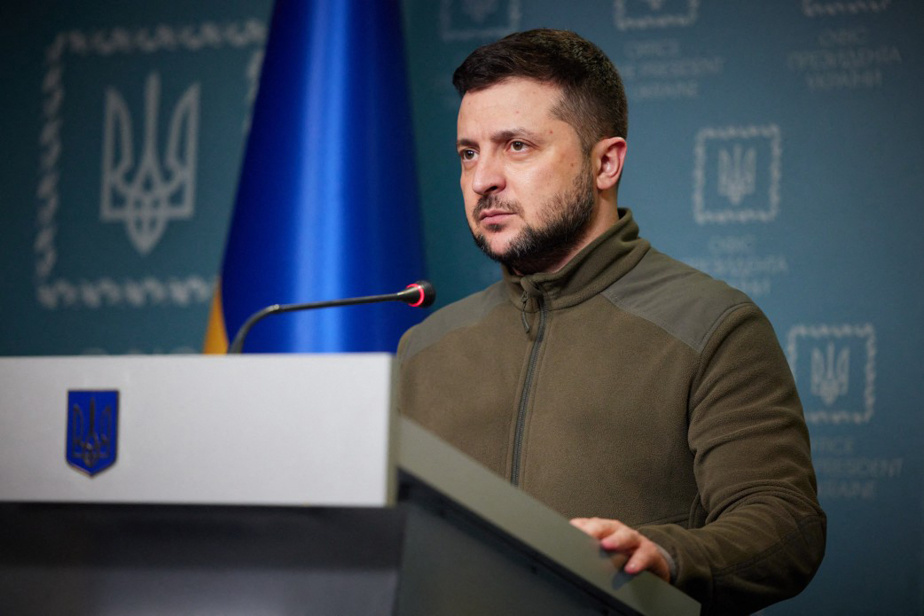
(Kyiv) The Ukrainian president confirmed that the Russian military is repositioning itself in the east of the country in anticipation of “powerful attacks”, particularly on the besieged port of Mariupol where a new attempt to evacuate civilians is scheduled for Friday.
Posted at 12:27 am
Russian President Vladimir Putin has threatened to cut gas supplies to “unfriendly” countries that refuse to pay in rubles, a measure aimed at bolstering the Russian currency that would fundamentally affect the European Union.
Russia indicated this week that it intends to reduce its activity in Kyiv and Chernigov in order to move its strike force from the north to the Donetsk and Luhansk (the separatist) regions in the east.
“This is part of their tactic,” Volodymyr Zelensky said in a speech Thursday and Friday evening.
The Ukrainian president added: “We know that they are moving away from the areas where we beat them to focus on other very important areas … where that can be difficult for us.” In particular, the situation in the east of the country is “extremely difficult.”
“In the Donbass and in Mariupol, in the direction of Kharkiv, the Russian army is strengthening in anticipation of strong attacks,” the president said.
An opinion shared by NATO Secretary-General Jens Stoltenberg, who believes that Russian forces are “not withdrawing, but repositioning” in the Donbass region, while continuing to “pressure on the capital, Kyiv and other cities.”
The Pentagon has warned that this refocusing portends a “protracted” conflict that could last for months.
Military experts believe that Moscow abandoned its plan to advance simultaneously along several axes in the north, east and south, due to the difficulties it faced in the face of a stronger than expected Ukrainian resistance.
According to US officials, Russia moved about 20% of its forces from around Kyiv after failing to capture the city.
But strikes on the capital are continuing, and Pentagon spokesman John Kirby said forces will likely be redeployed, possibly in Belarus, to be retooled, resupplied and used elsewhere in Ukraine.
More than a month after the invasion of Ukraine, the port of Mariupol, a strategic port in southeastern Ukraine, on the Sea of Azov, remains besieged and relentlessly bombed. At least 5,000 people died, and 160,000 civilians are believed to be still stuck in the city.
The leader of the Russian-Caucasian Republic of Chechnya, Ramzan Kadyrov, of which thousands of men are fighting in this city, asserted that 90-95% is under Russian control. He gave the last of the Ukrainian defenders, entrenched at the Azovstal Metallurgical Plant, a day to lay down their arms and surrender.
attempt to evacuate
For its part, the British Ministry of Defense reported “heavy battles in Mariupol”, but stressed that the Ukrainians “retain control of the city centre”.
An evacuation attempt is scheduled for Friday. The ICRC delegation to Ukraine wrote on Twitter that it was in the nearby town of Zaporizhia, where buses are supposed to arrive from the besieged city.
We hope we can facilitate the safe passage of civilians desperate to flee Mariupol. “We’re also here with two trucks to help,” Lucille Marbow of the organization said in a video posted to Twitter.
The Ukrainian government announced that it had sent dozens of buses to Mariupol, and the local government said on Telegram that civilians could begin boarding Friday morning in the neighboring town of Berdyansk.
People who managed to leave the besieged city and NGOs described the disastrous conditions there, with civilians holed up in basements, deprived of water, food and communications, and corpses strewn in the streets. The municipality also accuses Moscow of evacuating more than 20,000 residents “against their will” to Russia.
On the diplomatic front, the European Union wants to persuade China to forgo Moscow’s help in the face of Western sanctions, during a virtual summit on Friday with Beijing.
“unfriendly” countries
For her part, Roberta Mitsola, President of the European Parliament, indicated Thursday evening, on Twitter, that she was “on her way to Kyiv.” She will be the first leader of a European institution to visit the Ukrainian capital since the beginning of the Russian invasion.
Previously, Vladimir Putin had announced that he had barred European leaders and a majority of MEPs from entering his territory, in response to sweeping sanctions targeting Moscow.
Buyers of Russian gas from “unfriendly” countries have threatened to cut off their supplies if they do not comply with the Kremlin’s demands, a move aimed at bolstering the ruble that will mainly affect the heavily dependent European Union.
They have to open accounts in rubles in Russian banks. From these accounts they will have to pay for the gas delivered tomorrow.
German Chancellor Olaf Scholz immediately responded that European countries would continue to pay for Russian gas in euros and dollars as “written in the contracts.”
In this context, French Economy Minister Bruno Le Maire, on a trip to Berlin, indicated that France and Germany are “preparing” for a possible halt to Russian gas imports.
After five weeks of war, 4 million refugees have fled Ukraine, to which should be added nearly 6.5 million internally displaced people, according to the United Nations. About 90% of those who have fled Ukraine are women and children.
Officials in Kyiv announced Thursday evening that Russian forces had left the Chernobyl nuclear power plant, which they had occupied since the first day of the invasion of Ukraine on February 24.
“They took with them members of the National Guard who had been held hostage since February 24,” Ukraine’s state agency Energotom said on Telegram, citing employees. Their number is unknown.






